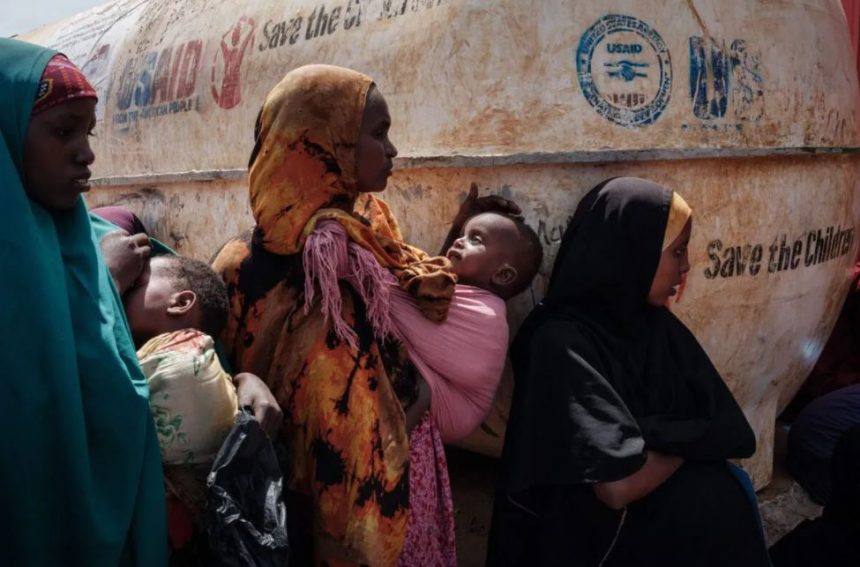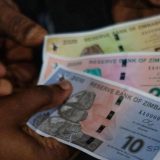The greatest drought to hit Somalia in 40 years is having a negative impact on the reproductive and mental health of women and girls.
Aisha Hussein, who was nine months pregnant with her first child, initially had labour pains in the early days of November and immediately realised she needed to travel from her town of Mareerey in Somalia’s Jubaland state to a health centre.
After a tiresome four-hour ride in a minibus taxi, the 16-year-old finally arrived at the mother and child hospital in Kismayo, a coastal city some 100 kilometres (62 miles) away.
It was the first time in her pregnancy that Hussein saw a doctor. Distance and the cost of seeking care held her back, she said, especially because of the drought. “I didn’t have money to access the nearest free maternal facility in Kismayo on time since we lost all our income from farming and couldn’t afford transport money,” she told Al Jazeera over the phone from Kismayo.
The United Nations Population Fund (UNFPA) in Somalia reports that the country is experiencing its worst drought in 40 years, which has imperilled and uprooted more than 1.9 million women and girls of reproductive age.
Due to the dry season, Mareerey, a once-vibrant agricultural community, is now desolate. When Hussein arrived at the clinic that day, the ward was crowded with yawning, coughing women and kids, many of whom were thin from months of starvation.
“I was also weak when I was admitted because I used to stay hungry for days while I was pregnant, and it was as a result of the severe drought,” Hussein said.
She was brought in for a medical evaluation by the medical personnel, but there were issues. Hussein was admitted to the operating room for a caesarian section procedure after four days of bleeding as medical personnel kept an eye on the infant. Tragically, she did, however, lose her daughter.
“I feel pain, but it’s God’s grace; God has given me before, and he has taken away; what can I do? Nothing,” an emotional Hussein said.
She is still recovering while being monitored by a doctor.
Hussein was treated by Kismayo general hospital physician Mahat Ali, who said Hussein was fortunate to have survived. Her kid was born 2.3 kg underweight due to malnutrition, persistent vaginal haemorrhage, and intrauterine development restriction, according to Ali, the doctor, who spoke to Al Jazeera.
“My malnourished body had an impact on the baby in the womb,” Hussein said.
With a rate of 692 fatalities per 100,000 live births, Somalia has one of the highest rates of maternal mortality in the world. According to the UN, the country’s already constrained sexual and reproductive health services have been further strained by the drought and population relocation.
Malnutrition among expectant and nursing mothers is also on the rise, endangering their health and wellbeing severely. According to Hussein’s physician, even if the infant had survived, the mother would not have been able to breastfeed her.
Noorta Ali, a 21-year-old farmer and mother of four who lives in an overcrowded and subparly furnished IDP camp outside of Baidoa, southern Somalia, almost 600 kilometres (372 miles) from the area Hussein was admitted.
After three consecutive failed rainy seasons in Awdiinle – a once agriculturally rich village 30km west of Baidoa where she used to live – Ali lost all her crops. “We didn’t have clean water to drink and anything to eat; we lost all our crops since there was no rainfall and no income,” Ali told Al Jazeera over the phone.
The drought’s wide-ranging effects have had a devastating effect on her farming activities, and her life.
Like Hussein, Ali did not see a doctor while pregnant last year, and she lost her newborn baby. “I gave birth in a village where the only option is a traditional midwife,” she explained. “I was struggling to provide for my family and didn’t think of my pregnancy; as a result, I lost my three-days-old underweight baby after he suffocated in the cervix,” she said.
After that, mum and her remaining four kids left the village. She is receiving treatment for anaemia, malnutrition, and skin conditions in the IDP camp where they reside.
According to a recent report by UNFPA, the UN agency for sexual and reproductive health, access to healthcare, particularly family planning and maternal health, has been seriously hampered in Somalian regions at famine risk.
“Nearly a quarter of a million women are currently pregnant, and 80,000 will give birth in the next three months – an average of 900 deliveries a day – in a country where maternal mortality rates are already high,” the report reads.
“Also 15 percent of all pregnant women in Somalia experience complications, implying 12,400 complicated deliveries in the next three months in the displaced population,” it continues.
Each of these figures represents a woman or girl of reproductive age who has been going through difficult circumstances, such as severe drought, increased food costs, severe water shortages, animal deaths, and the loss of livelihoods, according to the research.
Somalia’s envoy for drought response, Abdirahman Abdishakur, says a disaster will happen unless there is an urgent intervention by the international community. “All concrete indications show the country is facing famine and 80 percent of the affected people are the women, children and the elderly, and if there is no adequate funding to respond, there will be a catastrophe in Somalia as a result of the climate change impact,” he told Al Jazeera.
“I was unable to feed my kids.”
The executive director of UNFPA, Natalia Kanem, stated that the organization is collaborating with other UN agencies to solve some of the issues, including stepping up the provision of services that save lives in the reproductive health and protection sectors.
“We are appealing for $79.4 million in Somalia for the remainder of 2022 and through 2023 as part of our Horn of Africa drought response and call on the international community to fund reproductive health and gender-based violence prevention and response services, including mental health and psychosocial support,” Kanem told Al Jazeera.
The UN estimates that at least 720,000 Somali women and girls are at danger of gender-based violence in addition to their everyday battle for survival.
Due to the increased distances that women must travel in order to collect food or water, which makes them more susceptible to sexual assault, there is a high prevalence of violence against women. According to UN data, there has been a 21 percent rise in recorded rape crimes in communities affected by the drought since 2021 among the roughly two million displaced women and girls of reproductive age.
Additionally, according to humanitarian officials, there is a critical need for increased mental health services for the despondent people living in the camps.
Asma Adan, 29, from Gof-gaduud, a village north-west of Baidoa, claims her sadness was brought on by losing everything to the drought, including crops and cattle, in a tent camp in the Dolow district.
“The worst was when I couldn’t get anything to feed my children for two days and had no clean water. My children and I become malnourished, and that has deeply affected my mental health,” Adan, who lives with her four children in the camp, told Al Jazeera. “I also lost my menstruation period because of the depression.”
At the Dolow Health Center, she is currently receiving treatment for a pelvic infection.
Hussein used to be the main provider for her family in Mareerey, despite her youth. Their lives have been completely upended by the worst drought she has ever known, according to her.
“I’m praying to God that we will overcome this and hope to go back to my rural area and the farming activities and rebuild my life,” Hussein said, still holding on to hope.







